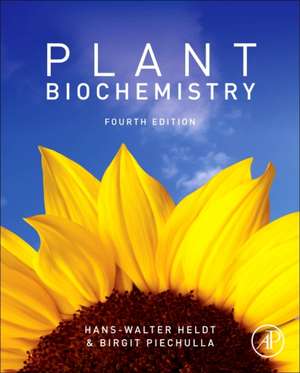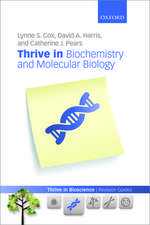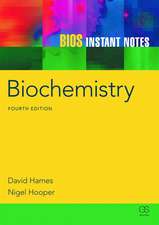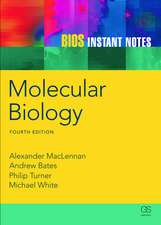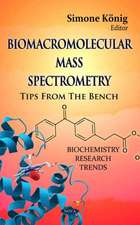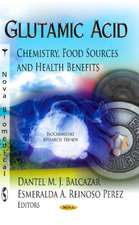Plant Biochemistry
Autor Hans-Walter Heldt, Birgit Piechullaen Limba Engleză Paperback – 19 aug 2016
Plants are the source of important industrial raw material such as fat and starch but they are also the basis for the production of pharmaceutics. It is expected that in the future, gene technology will lead to the extensive use of plants as a means of producing sustainable raw material for industrial purposes. As such, the techniques and use of genetic engineering to improve crop plants and to provide sustainable raw materials for the chemical and pharmaceutical industries are described in this edition. The latest research findings have been included, and areas of future research are identified.
- Offers the latest research findings in a concise and understandable manner
- Presents plant metabolism in the context of the structure and the function of plants
- Includes more than 300 two-color diagrams and metabolic schemes
- Covers the various commercial applications of plant biochemistry
- Provides extensive references to the recent scientific literature
Preț: 631.29 lei
Preț vechi: 819.86 lei
-23% Nou
Puncte Express: 947
Preț estimativ în valută:
120.81€ • 125.86$ • 100.45£
120.81€ • 125.86$ • 100.45£
Carte tipărită la comandă
Livrare economică 10-24 februarie 25
Preluare comenzi: 021 569.72.76
Specificații
ISBN-13: 9780128102145
ISBN-10: 0128102144
Pagini: 656
Dimensiuni: 191 x 235 x 38 mm
Greutate: 1.27 kg
Ediția:4
Editura: ELSEVIER SCIENCE
ISBN-10: 0128102144
Pagini: 656
Dimensiuni: 191 x 235 x 38 mm
Greutate: 1.27 kg
Ediția:4
Editura: ELSEVIER SCIENCE
Cuprins
1. A Leaf Cell Consists of Several Metabolic Compartments2. The Use of Energy from Sunlight by Photosynthesis is the Basis of Life on Earth 3. Photosynthesis is an Electron Transport Process 4. ATP is Generated by Photosynthesis 5. Mitochondria are the Power Station of the Cell 6. The Calvin Cycle Catalyzes Photosynthetic CO2 Assimilation 7. In the Photorespiratory Pathway Phosphoglycolate Formed by the Oxygenase Activity of RubisCo is Recycled 8. Photosynthesis Implies the Consumption of Water9. Polysaccharides are Storage and Transport Forms of Carbohydrates Produced by Photosynthesis 10. Nitrate Assimilation is Essential for the Synthesis of Organic Matter 11. Nitrogen Fixation Enables the Nitrogen in the Air to be Used for Plant Growth 12. Sulfate Assimilation Enables the Synthesis of Sulfur Containing Substances 13. Phloem Transport Distributes Photoassimilates to the Various Sites of Consumption and Storage14. Products of Nitrate Assimilation are Deposited in Plants as Storage Proteins 15. Glycerolipids are Membrane Constituents and Function as Carbon Stores 16. Secondary Metabolites Fulfill Specific Ecological Functions in Plants17. Large Diversity of Isoprenoids has Multiple Funtions in Plant Metabolism18. Phenylpropanoids Comprise a Multitude of Plant Secondary Metabolites and Cell Wall Components 19. Multiple Signals Regulate the Growth and Development of Plant Organs and Enable Their Adaptation to Environmental Conditions20. A Plant Cell has Three Different Genomes 21. Protein Biosynthesis Occurs at Different Sites of a Cell 22. Gene Technology Makes it Possible to Alter Plants to Meet Requirements of Agriculture, Nutrition, and Industry
Recenzii
Praise for the third edition:"Plant Biochemistry will be an invaluable resource for students, teachers and researchers looking for a clear, up to date presentation which covers the essentials without being overwhelmed by details. There are simple, easy to grasp illustrations throughout....I would highly recommend this book as a text in plant biochemistry, physiology and biotechnology courses. The book highlights examples on how an understanding of plant biochemistry is fundamental towards the applications of biotechnology, which are bringing about a revolution in agriculture." --Gerald Edwards, Washington State University
"This is a welcome addition to the sparsely populated topic of recent textbooks in plant biochemistry. It complements rather than unnecessarily duplicates the many fine general biochemistry volumes available...The contents are well organized and laid out with logical and informative section titles. The text is nicely illustrated and regularly gives a clear and easily understandable overview of complex subjects, as well as provides some additional detail...This book will be an excellent introduction and overview of plant biochemistry to anyone interested in the subject. It also provides a nice reference for students of pharmacy, nutrition, environmental sciences, and ecology, as well as general biology students. As such, it will be a good textbook for classes associated with these subjects." --David Hildebrand, Agronomy, University of Kentucky in QUARTERLY REVIEW OF BIOLOGY
"The book Plant Biochemistry and Molecular Biology by Professor Hans Heldt is an outstanding text. The material is elegantly presented, with attention to molecular structures, intracellular compartmentation, and regulatory mechanisms controlling metabolism. Difficult topics are presented with incredible clarity and with a style that reflects many decades of cutting-edge research and effective teaching by the author. I highly recommend this book for both students and researchers in the field of plant biochemistry." --Steve Huber, University of Illinois
"The third edition of Plant Biochemistry by Hans-Walter Heldt updates my favorite text on this topic. My students prefered the first edition of this book to more encyclopedic treatments by a wide margin. The book covers aspects of biochemistry that are essential to a broad understanding of plant function. The book is focused on clear explanations of the essential concepts rather than an encyclopedic approach. Simple diagrams make even complex topics clear. The typeface and layout of the new edition is improved, with important words in bold, making important topics stand out for easy comprehension. This book is invaluable as a text for any plant biochemistry course." --Thomas Sharkey, University of Wisconsin
"This is a welcome addition to the sparsely populated topic of recent textbooks in plant biochemistry. It complements rather than unnecessarily duplicates the many fine general biochemistry volumes available...The contents are well organized and laid out with logical and informative section titles. The text is nicely illustrated and regularly gives a clear and easily understandable overview of complex subjects, as well as provides some additional detail...This book will be an excellent introduction and overview of plant biochemistry to anyone interested in the subject. It also provides a nice reference for students of pharmacy, nutrition, environmental sciences, and ecology, as well as general biology students. As such, it will be a good textbook for classes associated with these subjects." --David Hildebrand, Agronomy, University of Kentucky in QUARTERLY REVIEW OF BIOLOGY
"The book Plant Biochemistry and Molecular Biology by Professor Hans Heldt is an outstanding text. The material is elegantly presented, with attention to molecular structures, intracellular compartmentation, and regulatory mechanisms controlling metabolism. Difficult topics are presented with incredible clarity and with a style that reflects many decades of cutting-edge research and effective teaching by the author. I highly recommend this book for both students and researchers in the field of plant biochemistry." --Steve Huber, University of Illinois
"The third edition of Plant Biochemistry by Hans-Walter Heldt updates my favorite text on this topic. My students prefered the first edition of this book to more encyclopedic treatments by a wide margin. The book covers aspects of biochemistry that are essential to a broad understanding of plant function. The book is focused on clear explanations of the essential concepts rather than an encyclopedic approach. Simple diagrams make even complex topics clear. The typeface and layout of the new edition is improved, with important words in bold, making important topics stand out for easy comprehension. This book is invaluable as a text for any plant biochemistry course." --Thomas Sharkey, University of Wisconsin
